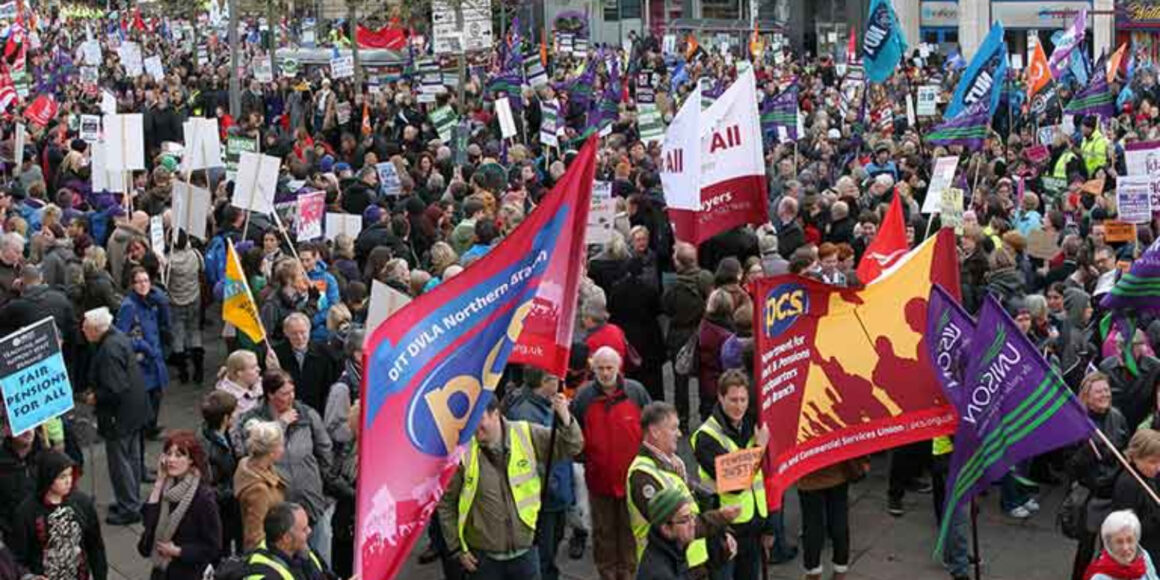

THE COST of living crisis is not easing, whatever ministers claim. Food, the most basic necessity of life, costs nearly 20% more than it did last year. Although energy costs have fallen, the withdrawal of government subsidies means household bills will remain at last year’s level next winter. Rents and mortgages are rising at their steepest rate for a decade, combined with a chronic housing shortage.
Most worryingly, core inflation – prices excluding fuel, food and housing – continues to rise, now standing at 6.8%. The government’s answer is to increase interest rates. As they climb to 5% and higher, banks will withdraw credit and companies will start to collapse, throwing hundreds of thousands out of work. The Chancellor Jeremy Hunt says a recession in the UK ‘would be a price worth paying’ to bring inflation down.
Strikes
Faced with this calamitous situation millions of workers naturally turned to their unions to defend themselves, erupting in the biggest strike wave for over 30 years. Yet the leaders’ strategy of a series of short strikes, followed by weeks or months of secret negotiations, has nowhere succeeded in winning above inflation pay deals.
Despite months of self-sacrifice and weeks of strike action, union leaderships are now asking their members to swallow yet another cut, the biggest in 12 years of falling real wages.
With the NHS facing a crisis of unprecedented severity – in part due to its failure to attract nurses, doctors, ancillary staff and ambulance crews on shrinking wages and increasing hours – major pay increases are vital to save services.
The obvious failure of the unions’ strategy is generating widespread anger in the workplace. This amounts to an acute crisis of leadership and applies to both left and right wing dominated executives and general secretaries. From the rail workers to the nurses, members have rejected dodgy deals and demanded further action. Now the CWU is too scared to put their scandalous agreement with Royal Mail to their members.
Our message is clear. If the union leaders won’t change their strategy, we must change our union leaders. In the short term, we need to reject the rotten deals they are recommending.
Rank and file
Rejecting the deals is only the first step. If it only leads to a few more months of on-off protest strikes, then the same offers, slightly repackaged, will come back to us. The union leaders and the bosses will then hope that demoralisation amongst members will cause many to reluctantly accept the cuts.
There is, however, an alternative. The rank and file must organise strike committees and demand control of the strikes. Rank and file trade unionists must elect representatives from these strike committees to sit in on all negotiations and have the power of veto over what is proposed and what is agreed. They know whether we can live on reduced rations or not, far more than the highly paid officials who will not lose a penny.
Workers should control when strikes are called, how long they last and when they are called off. We must move from one or two day protest actions to all-out strikes which have the power to bring bosses and ministers to their knees.
If we coordinate our strikes, creating a general strike from below, the political pressure will force the Tories to find the money to settle these disputes on our terms. It is now up to the rank and file to take up this idea and put it into practice, creating councils of action in every town and borough with delegates from union branches and the community, capable of supporting strikers, up to and including delivering solidarity strike action.
Transform the unions
However this strike wave ends, it will not be the end of the bosses’ offensive: more pay cuts, more intensive working conditions and more laws to outlaw our strikes and victimise our activists are on the way.
That is why we fight to transform the unions, so that next time we start our struggles with stronger and more democratic unions. We must replace our bureaucratic leaders with genuine representatives of the rank and file, prepared to live on our wages, to make themselves accountable to the membership and to mount serious resistance to the bosses.
We must throw our energy into recruiting every worker in our workplaces and unionise the forgotten millions of low paid, precarious workers. We must win them to a fight for a minimum wage of £15 an hour, for above inflation pay deals that restore the wages lost over the Tory years and for escalator clauses in every deal, so our gains are not whittled away by inflation.
We must add political demands to our campaigns, the most important being the repeal of the repressive anti-trade union laws, nationalisation of the rail, mail and utilities like water and power, throwing the profiteers out of the NHS and placing all our services under the control of the workers and the communities they serve.
Last but not least, the rejuvenation of our unions cannot be complete unless we can win them to a revolutionary party committed to the goal of socialism, a society without bosses and bankers, where the working class can plan production and social services according to need, not greed.